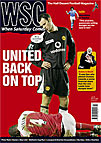 Gillingham chairman Paul Scally is up in arms at Charlton’s attempts to win fans on his patch, aided by the launch of a bus service. Haydn Parry reports from the Kent Badlands
Gillingham chairman Paul Scally is up in arms at Charlton’s attempts to win fans on his patch, aided by the launch of a bus service. Haydn Parry reports from the Kent Badlands
“It goes against the grain of ethics, custom, practice and principles in the business in which we operate. They will be sorry for this behaviour.” That was the reaction of Gillingham chairman Paul Scally to neighbouring Charlton’s ongoing plans to enlarge their fan base in Kent. The Addicks recently expanded their community scheme into the county as part of the club’s “Target 40,000” campaign, a bid to attract more supporters, including those in the Medway area in which Gillingham are based. Since January, supporters can travel to The Valley to watch Charlton’s home matches courtesy of a special coach service and Gillingham is now one of 30 pick-up points visited by the “Valley Express”.
To say the scheme has irked Gillingham chairman Paul Scally is an understatement and he has responded with typical hyperbole: “Charlton are roller-coasting through Kent trying to build their customer base.” While Charlton are looking to increase The Valley’s capacity to 40,000, Gillingham’s Priestfield stadium holds around 11,000 but has had average home gates that hover nearer the 8,000 mark this season and those figures tell their own story.
The Medway towns offer a very large potential fan base with a population of more than 250,000, yet Gillingham have struggled to fill Priestfield, even in a five-year period that has seen the Gills just one rung below the top flight for the first time in the club’s history, having been in the bottom tier as recently as 1996. Five years ago the club took pride in their 43,000-strong support at Wembley for the Division Two play-off final victory against Wigan, revealing what had been until that point a massive, untapped fan base. Where four-fifths of the “fans” who turned out that day have gone in the intervening period must vex the Gills chairman. Scally’s ongoing spat with the Gillingham Independent (now) Supporters’ Club, including a ban from Priestfield for its erstwhile chairman, hasn’t helped to project the kind of communal spirit for which a club such as Charlton are renowned. Yet the root of the problem lies much deeper than that.
Gillingham may be in a unique position as the only team in Kent, but have traditionally always lost a lot of potential supporters to the top-flight football available in the capital just a short train or, indeed, a £5 bus ride away. Charlton are just one of six clubs in nearby London offering Premiership football, rather than the current relegation struggle on offer at Priestfield. However, Charlton chief executive Peter Varney, speaking at the official launch of the coach scheme, claimed his club weren’t encroaching on Gillingham’s support but merely tapping into a new potential fan base that otherwise would go over to rivals in the Premiership: “We are aiming at unattached fans who don’t support clubs because you will not get fans to change their allegiances. Two-thirds of our support is already from Kent and the county is full of Arsenal and Chelsea fans. With the expansion in the south-east, we believe we can extend the capacity of our ground to 40,000 and filling it is a realistic aim.”
Are Gillingham supporters as appalled as their chairman by their neighbour’s ambitious encroachment? Chris Lynham of the Gills fanzine Brian Moore’s Head can understand why Scally is irked, but believes it’s the reality of football as business: “It’s simply playing the free market – every club is entitled to tap into whatever market they see as realistically attainable. Man Utd do it on a global scale – and Charlton are just doing it on a regional scale.
“They have caused a stir because they are particularly good at it. In a little over ten years, through very astute marketing and sensible ticket pricing, they’ve turned themselves from a 8,000 club to a 26,000 club – something Gillingham now need to do. It’ll undoubtedly mean attractive ticket prices, so I don’t think anyone should argue about a club bringing in affordable Premiership football.”
Nevertheless, there’s an obvious exasperation from the Gills chairman at the reluctance of some locals to attend home games at Priestfield regularly: “When we achieved First Division football, I was of the view that this stadium would be full more frequently than not and have budgeted on that basis. Sadly, my expectations have not been met and I do wonder what we need to do, over and above what we’re doing already, to remedy this situation. I would be happy to listen to ideas, but am fairly confident we’ve considered just about all the options over the past four or five years.”
Whether it’s “Bring a friend for a fiver”, special one-off cheap matchday prices or “kids’ specials”, it’s fair to say Gillingham have tried the lot in recent seasons – although it’s probably best right now not to suggest a fans’ bus scheme to the chairman.
From WSC 217 March 2005. What was happening this month